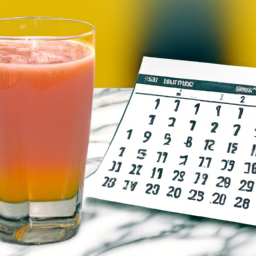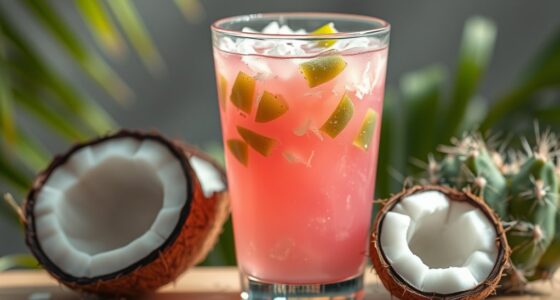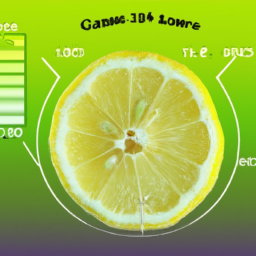As I hold onto a freshly squeezed orange, my thoughts quickly turn to the refreshing taste of its juice. Remembering the delightful sensation of sipping on orange juice during a hot summer day brings back fond childhood memories. However, as I navigate adulthood, I am now faced with the practical issue of the juice’s expiration date before it goes bad.
Freshly squeezed orange juice is a treat for the senses. Its vibrant color and citrusy scent make it a delight to the eyes and nose. But, as much as we would like to savor this delicious beverage for as long as possible, it doesn’t last forever.
Understanding the shelf life of freshly squeezed orange juice is crucial to ensure that we can consume it safely without risking our health. In this article, I will delve into the factors that affect the longevity of the juice, and provide insights into how to make it last longer.
Key Takeaways
- Fresh squeezed orange juice lasts 2-3 days in the fridge.
- Glass containers with airtight lids keep juice fresh for up to 5 days.
- Bacteria growth is affected by temperature, moisture, acidity, and oxygen availability.
- Cleanliness is key to ensuring safety.
The Shelf Life of Fresh Squeezed Orange Juice
Fresh squeezed orange juice has a shelf life of about 2-3 days in the fridge. This means it’s best to consume the juice within this time frame to ensure its freshness and optimal taste.
After this period, the juice may start to ferment, resulting in a sour taste and unpleasant odor. Several factors affect the shelf life of fresh squeezed orange juice.
Exposure to light and heat can accelerate the fermentation process and cause the juice to spoil faster. Additionally, the presence of bacteria and other microorganisms can also contribute to the deterioration of the juice.
It’s important to understand bacterial growth and how it can affect the shelf life of orange juice to ensure that it’s consumed safely.
Understanding Bacterial Growth
It’s crucial to stay ahead of the curve when it comes to harmful bacteria multiplying in your juice. Understanding food spoilage and the factors that affect bacterial growth can help you keep your juice fresh and safe to drink. Food spoilage is the deterioration of food quality that results in an unpleasant taste, odor, and appearance, making it unsuitable for consumption. Bacteria are one of the primary causes of food spoilage and can contaminate food, including fresh-squeezed orange juice.
Factors that affect bacterial growth include temperature, moisture, acidity, and oxygen availability. In the table below, you can see how these factors influence the growth of bacteria in your juice. By controlling these factors, you can prolong the shelf life of your orange juice. In the next section, we’ll discuss the importance of cleanliness in preventing bacterial growth in your fresh-squeezed orange juice.
| Factor | Ideal Condition for Bacterial Growth |
|---|---|
| Temperature | Between 40°F and 140°F (4°C and 60°C) |
| Moisture | High humidity or moist environment |
| Acidity | pH between 4.6 and 7.5 |
| Oxygen Availability | Aerobic or anaerobic environment |
| Nutrients | Presence of organic matter |
Understanding the factors that affect bacterial growth can help you keep your fresh-squeezed orange juice safe to drink. By controlling the temperature, moisture, acidity, oxygen availability, and nutrients in your juice, you can prevent the growth of harmful bacteria. However, it’s not enough to rely solely on these factors. The importance of cleanliness cannot be overstated when it comes to preventing bacterial growth in your juice.
The Importance of Cleanliness
Maintaining a clean environment is key to ensuring the safety of your homemade OJ. The importance of hygiene can’t be overstated, especially when it comes to preventing bacterial growth.
Any surface or equipment that comes into contact with the juice must be thoroughly cleaned and sanitized before use. This includes cutting boards, knives, juicers, and containers.
There are various cleaning methods that can be used, such as using hot soapy water, bleach solution, or vinegar solution. It’s important to follow the manufacturer’s instructions for cleaning the equipment and to use the appropriate cleaning solution for each material.
Additionally, hands should be washed thoroughly before handling any equipment or ingredients.
By maintaining a clean and hygienic environment, you can help prevent the growth of harmful bacteria and ensure the safety of your fresh squeezed orange juice.
To further extend the shelf life of your homemade OJ, you can consider using preservatives. However, it’s important to note that adding preservatives may alter the taste and nutritional value of the juice.
Using Preservatives
If you’re hesitant about using preservatives in your homemade OJ, rest assured that there are natural options available to keep your juice safe to consume. Preservative-free options include adding lemon juice, citric acid, or vitamin C to your juice. These options not only keep your juice fresh for longer, but they also add some extra flavor to your OJ.
Another option is to store your juice in a glass container with an airtight lid in the refrigerator. This method can keep your juice fresh for up to 5 days without any preservatives.
Using preservatives can have an impact on the taste and quality of your juice. Some preservatives can add an artificial taste to your juice and may not be the best option if you’re looking for a natural flavor. However, preservatives can also be a great option if you want to store your juice for a longer period of time.
Ultimately, the choice to use preservatives or not is up to personal preference. If you want to avoid preservatives altogether, freezing fresh-squeezed orange juice is another great option to consider.
Freezing Fresh Squeezed Orange Juice
Freezing fresh OJ is a simple and easy way to enjoy your favorite citrus drink all year round. Not only does it preserve the nutritional value of the juice, but it also allows you to create unique and creative recipes with the frozen juice.
To freeze fresh squeezed orange juice, simply pour it into ice cube trays and place them in the freezer. Once frozen, transfer the cubes into a resealable plastic bag and store in the freezer for up to six months.
Using frozen orange juice cubes is a great way to add a burst of citrus flavor to smoothies, cocktails, and even baked goods. Simply pop the desired amount of cubes into your recipe and enjoy the fresh taste of orange juice.
If you’re looking to make small batches of fresh squeezed juice, consider investing in a citrus press.
Making Small Batches
Making small batches of orange juice has numerous benefits. First, it allows me to control the quality and freshness of the juice. Second, I can experiment with different flavors and ingredients without committing to a large batch.
To make small batches, I follow a few simple tips such as using a handheld juicer, selecting the ripest oranges, and storing the juice in airtight containers.
Benefits of Making Small Batches
While it may be tempting to make a large batch of fresh squeezed orange juice, there are numerous benefits to sticking with smaller quantities. One of the biggest benefits is the ability to experiment with creative recipes. When making small batches, you can easily add different fruits, spices, or sweeteners to create unique flavor combinations. This can be especially fun when hosting brunch or a gathering with friends and family. Plus, with smaller quantities, you won’t have to worry about wasting a large amount of juice if an experimental recipe doesn’t turn out as expected.
Another benefit of making small batches of fresh squeezed orange juice is the ability to store it more easily. When dealing with large batches, finding enough space in the fridge or freezer can be a challenge. However, with smaller quantities, you can easily store the juice in a mason jar or other small container without taking up too much space. Plus, when it comes time to consume the juice, you won’t have to worry about it going bad before you have a chance to finish it.
Now, let’s move on to some tips for making small batches of fresh squeezed orange juice.
Tips for Making Small Batches
To ensure a delicious and refreshing glass of juice every time, try using a citrus squeezer when preparing small batches of fresh orange juice at home. Not only does this method produce a higher yield of juice, but it also helps to retain more of the essential oils and nutrients found in the orange peel. When selecting a juicer, look for one with a sturdy construction and a comfortable grip to make the squeezing process easier and more efficient.
Another important factor to consider when making small batches of fresh orange juice is citrus fruit storage. To maximize the juice yield and flavor, it is best to use oranges that are at room temperature and slightly soft to the touch. To keep them fresh for longer, store them in a cool, dry place away from direct sunlight. By following these tips, you can enjoy a delicious glass of fresh squeezed orange juice anytime. Moving on to the next section, let’s explore the benefits of using citric acid in our juice-making process.
Using Citric Acid
Adding citric acid can help extend the shelf life of fresh squeezed orange juice, so you can enjoy it for a longer period of time. Citric acid is a natural preservative that prevents the growth of bacteria and mold in the juice. By adding citric acid, you can prolong the freshness of your orange juice by up to a week.
There are different ways to use citric acid to extend the shelf life of orange juice. One method is to add 1/4 teaspoon of citric acid per quart of juice, which is equivalent to the amount of acid found in one fresh orange. Another method is to mix the citric acid with water and add it to the juice in a spray bottle. This allows you to evenly distribute the citric acid throughout the juice and helps prevent spoilage.
With the use of natural alternatives and shelf life extension methods, you can keep your fresh squeezed orange juice fresh for longer and avoid wasting it.
Alternatively, if your orange juice has already gone bad, there are still alternative uses for it instead of throwing it away.
Alternative Uses for Spoiled Orange Juice
I’ve been wondering what to do with my spoiled orange juice. A few questions came to my mind:
- Can I mix it with other juices to make it drinkable again?
- Can I still drink it after the expiration date?
- And can I use it for cooking even though it’s already expired?
Let’s explore these alternative uses for spoiled orange juice.
Can You Mix Orange Juice with Other Juices?
You may wonder if mixing orange juice with other juices is a good idea, but it can actually enhance the overall flavor and nutrition of your drink. When it comes to mixing ratios, it’s important to find the right balance between the flavors.
Some popular combinations include orange juice mixed with grapefruit juice, pineapple juice, or even cranberry juice. These mixtures not only add a variety of flavors to your drink but also provide additional nutrients such as vitamin C, potassium, and antioxidants.
When looking for the best flavor combinations, experiment with different ratios until you find the perfect blend. Try mixing equal parts orange juice and grapefruit juice for a tangy and refreshing drink, or mix orange juice with pineapple juice for a tropical twist.
It’s important to note that some juices may be high in sugar, so be mindful of your intake. Now that you know the benefits of mixing orange juice with other juices, let’s discuss whether or not you can still enjoy orange juice after the expiration date.
Can You Drink Orange Juice After the Expiration Date?
Unfortunately, drinking expired orange juice is like playing Russian roulette with your health – you never know when it’s going to hit you. Consuming expired juice can pose a serious health risk as it may contain harmful bacteria that can cause foodborne illnesses.
These bacteria can grow in the juice over time, and consuming it can lead to symptoms such as stomach cramps, nausea, vomiting, and diarrhea.
When it comes to using expired juice in recipes, it’s best to err on the side of caution and avoid it altogether. The potential health risks of consuming expired juice are not worth the risk, even in small amounts.
Instead, consider using fresh juice for your recipes, or purchase a new carton of juice if you’re unsure about the freshness of the one you have on hand.
Can you use expired orange juice for cooking? Let’s find out in the next section.
Can You Use Expired Orange Juice for Cooking?
Using expired orange juice in your cooking can be risky and potentially harmful to your health. Even though some people might think that expired juice can still be used in cooking, it is not recommended. The expiration date on the packaging is there for a reason, and consuming expired products can lead to food poisoning or other health risks. Additionally, expired orange juice might have undergone flavor changes that could negatively impact the taste of your dish.
To illustrate the potential risks of using expired juice in cooking, here is a table that shows the changes in orange juice as it ages:
| Age of Orange Juice | Changes in Flavor |
|---|---|
| Freshly squeezed | Sweet and tangy taste |
| 1-2 days old | Slightly less sweet, still tangy |
| 3-4 days old | Sour taste, less fresh |
| 5-7 days old | Bitter taste, might have a rancid smell |
As you can see, the flavor of orange juice changes over time, and it is not advisable to use juice that is more than a few days old in your cooking. To ensure the safety and quality of your meals, it is best to use fresh ingredients and avoid using expired products.
Frequently Asked Questions
What are the best types of oranges to use for fresh squeezed orange juice?
I recommend using juicy varieties like Valencia or Navel oranges for fresh squeezed orange juice. These types have high nutritional benefits and yield a sweet, flavorful juice. It’s important to use ripe fruit for optimal juice extraction.
Can I mix fresh squeezed orange juice with other fruits or vegetables?
I love juice combinations that include fresh squeezed orange juice mixed with other fruits and vegetables. Not only do they taste great, but they also provide a variety of nutritional benefits.
How do I properly store fresh squeezed orange juice to extend its shelf life?
To extend the shelf life of fresh squeezed orange juice, proper storage techniques are crucial. Factors such as temperature, light exposure, and air exposure can impact its freshness. Keep it refrigerated in an airtight container for best results.
Is it safe to drink fresh squeezed orange juice if I have a compromised immune system?
As someone with a weakened immune system, I recommend consuming fresh squeezed orange juice within a few days of making it. This ensures maximum freshness and reduces any potential risk of contamination.
What are some common signs that fresh squeezed orange juice has gone bad?
Color changes and an off smell are common signs of bad fresh squeezed orange juice. To identify spoiled OJ, trust your senses and avoid drinking it. Always store it properly, and consume within a few days.
Conclusion
Well, after all that research, I can confidently say that fresh squeezed orange juice can last for eternity! Okay, maybe not quite that long, but with the right techniques and precautions, it can last for a while.
Understanding bacterial growth and practicing cleanliness are crucial to extending the shelf life of your juice. Using preservatives and freezing can also help prolong its freshness. And if all else fails, don’t throw out that spoiled orange juice just yet – it can still be used in other ways, like cleaning or cooking.
But seriously, don’t keep your juice forever. It’s always best to consume it as soon as possible for maximum flavor and nutrition.
With these tips, you can enjoy your fresh squeezed orange juice for days, if not weeks. So go ahead and make that big batch of juice – just remember to store it properly and drink up before it’s too late!









